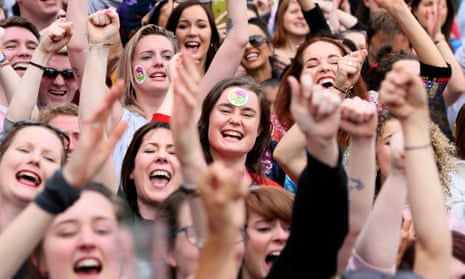In August 2016 there was a knock on my front door. A man from a polling company introduced himself – he was selecting people to take part in a national forum to discuss social issues in Ireland. One of the topics to be debated was our country’s strict abortion laws.
I said yes, not entirely sure what I was signing up for. A week later there was a phone call to verify that I was on the register to vote, and then my place as one of the 100 members of the Citizens’ Assembly was confirmed. An explainer booklet came in the post along with an invitation to Dublin Castle for the inaugural meeting in October 2016.
There were nerves in the room on the first day of the assembly. We were told that our full names would be published on the assembly’s website – some people were concerned that they would be targeted by abortion campaigners but to my knowledge this never happened.
While the majority of our time was taken up with the abortion debate, we also examined other topics – including issues arising from an ageing population and Ireland’s role in tackling climate change. In 2013 the similarly styled Convention on the Constitution took place – the 2015 marriage equality referendum was a result of that assembly’s recommendations.
Some form of citizens’ assembly has been talked up as a way to resolve Britain’s seemingly intractable divisions over its decision to leave the EU. My experience shows that some of the most polarising issues can be tackled in this manner.
During the process there was a lot of cynicism in the media and among pro-choice lobby groups. It was felt that this was merely an exercise in kicking the can down the road: since the introduction of the 8th amendment to the Irish constitution by referendum in 1983, recognising the equal right to life of the pregnant woman and the unborn child, the abortion debate in Ireland has long been a particularly fraught one. Irish politics can be quite parochial and few politicians wanted to nail their colours to the mast, for fear of alienating constituents.
As a group of 100 citizens, it felt there was a good mix of men and women with a broad range of ages and backgrounds. The atmosphere was friendly but serious – we were proud to have been given an important task. We wanted to take in all the information, help shape the debate and make solid recommendations that were representative of our views at the end of a period of deep learning about the topics.
The deliberations on abortion took place over five weekends. We met on the Friday evening, sessions began first thing Saturday morning and ran all day. Then on Sunday we met again early and sessions went on until mid-afternoon. On the the first weekend, we were presented with the “current situation” – the legal position and it’s consequences, the medical position and how the current laws affected pregnant women. We were set up at tables with about six assembly members, a note-taker and a facilitator. The facilitator would take note of who was contributing: if one person was speaking too much they were gently reminded that we needed to hear all opinions, while quieter members were encouraged to speak.
The chair of the assembly, Justice Marie Laffoy, did an excellent job of managing the room – aided by an expert advisory panel, made up of legal and medical professionals.
We weren’t polled on our opinions before joining but I was pro-choice – while my position on this did not change, the nuance and rationale for it was greatly expanded.
While the majority of our time was taken up with the abortion debate, we did tackle other important topics such as “The challenges and opportunities of an ageing population” and “How Ireland could become a leader in tackling climate change”. Each weekend we were given a range of speakers: given the polarised nature of the abortion debate, we were presented with clear pro-choice and anti-abortion speakers. When the assembly made our recommendations to parliament, including calling for unrestricted access to abortion, there was widespread shock. Some politicians and campaigners said we had gone too far – that Ireland was not ready for change of this magnitude. It turns out, it was – the subsequent referendum last year resulted in 66% voting in favour of removing the 8th amendment. It makes you wonder how much politicians truly grasp what their constituents want.
I would definitely take part in a Citizens’ Assembly again. I felt empowered and informed – it gave me the language and skills to have difficult discussions. In a room of 100 people, only a handful ever tried to create division or build walls among us. I think most people want to find things to agree on and to discover common ground – through this we can always learn new ways to go forward.
